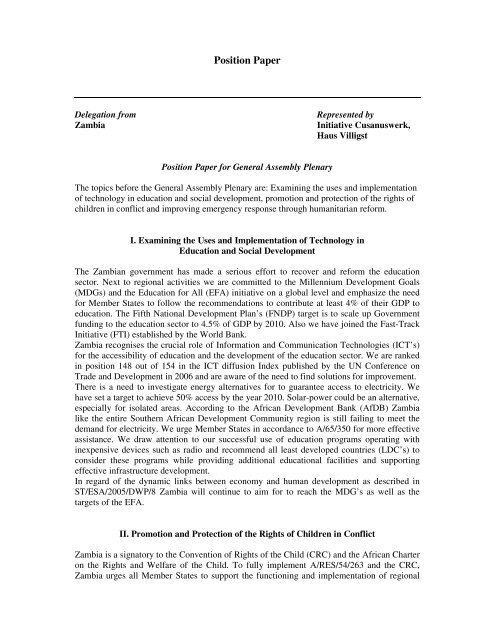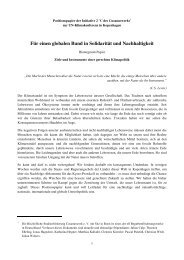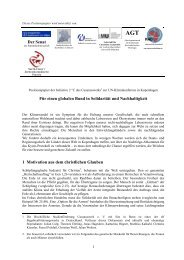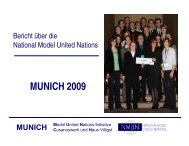Position Paper - Cusanus.net
Position Paper - Cusanus.net
Position Paper - Cusanus.net
You also want an ePaper? Increase the reach of your titles
YUMPU automatically turns print PDFs into web optimized ePapers that Google loves.
<strong>Position</strong> <strong>Paper</strong><br />
Delegation from<br />
Zambia<br />
Represented by<br />
Initiative <strong>Cusanus</strong>werk,<br />
Haus Villigst<br />
<strong>Position</strong> <strong>Paper</strong> for General Assembly Plenary<br />
The topics before the General Assembly Plenary are: Examining the uses and implementation<br />
of technology in education and social development, promotion and protection of the rights of<br />
children in conflict and improving emergency response through humanitarian reform.<br />
I. Examining the Uses and Implementation of Technology in<br />
Education and Social Development<br />
The Zambian government has made a serious effort to recover and reform the education<br />
sector. Next to regional activities we are committed to the Millennium Development Goals<br />
(MDGs) and the Education for All (EFA) initiative on a global level and emphasize the need<br />
for Member States to follow the recommendations to contribute at least 4% of their GDP to<br />
education. The Fifth National Development Plan’s (FNDP) target is to scale up Government<br />
funding to the education sector to 4.5% of GDP by 2010. Also we have joined the Fast-Track<br />
Initiative (FTI) established by the World Bank.<br />
Zambia recognises the crucial role of Information and Communication Technologies (ICT’s)<br />
for the accessibility of education and the development of the education sector. We are ranked<br />
in position 148 out of 154 in the ICT diffusion Index published by the UN Conference on<br />
Trade and Development in 2006 and are aware of the need to find solutions for improvement.<br />
There is a need to investigate energy alternatives for to guarantee access to electricity. We<br />
have set a target to achieve 50% access by the year 2010. Solar-power could be an alternative,<br />
especially for isolated areas. According to the African Development Bank (AfDB) Zambia<br />
like the entire Southern African Development Community region is still failing to meet the<br />
demand for electricity. We urge Member States in accordance to A/65/350 for more effective<br />
assistance. We draw attention to our successful use of education programs operating with<br />
inexpensive devices such as radio and recommend all least developed countries (LDC’s) to<br />
consider these programs while providing additional educational facilities and supporting<br />
effective infrastructure development.<br />
In regard of the dynamic links between economy and human development as described in<br />
ST/ESA/2005/DWP/8 Zambia will continue to aim for to reach the MDG’s as well as the<br />
targets of the EFA.<br />
II. Promotion and Protection of the Rights of Children in Conflict<br />
Zambia is a signatory to the Convention of Rights of the Child (CRC) and the African Charter<br />
on the Rights and Welfare of the Child. To fully implement A/RES/54/263 and the CRC,<br />
Zambia urges all Member States to support the functioning and implementation of regional
children’s programs and take responsibilities for a smooth and quick organization and<br />
exchange of information.<br />
Zambia ratified the ILO Convention number 138 on the Minimum Age and number 182 on<br />
the Worst Forms of Child Labour. We emphasize the need for States in Conflict to establish<br />
support for children as called for in A/C.3/63/L.16. According to Section 14, Chapter 106<br />
(article 8 ICCPR) a recruiting officer in Zambia can not enlist a person under the age of 18 for<br />
military services unless the parents or a guardian allows it.<br />
Relating to A/RES/54/263 we are gravely concerned about Zambian children. Due to the<br />
AIDS pandemic the number of orphan and vulnerable children (OVCs) increases and<br />
especially girls will face poverty, malnutrition and many will be exposed to violence, abuse<br />
and child prostitution. We urge Member States to increase donations to intergovernmental<br />
organizations and NGO’s that support programs (like APCAN: Association for the Prevention<br />
of Child Abuse and Neglect) for children in need in Zambia and whole Africa.<br />
We continue our efforts to ensure, that we consider the African Charter on the Rights and<br />
Welfare of the Child according to CAB/LEG/153/Rev2.<br />
III. Improving Emergency Response through Humanitarian Reform<br />
Zambia strongly believes that all human beings share the inalienable right to live with dignity.<br />
Especially in emergency situations and times of need, mankind is bound to guarantee the<br />
integrity of every man’s dignity. We emphasise the need of a thorough humanitarian reform to<br />
improve the global emergency response. Therefore Zambia appreciates the reform process<br />
launched by the Humanitarian Response Review commissioned in 2005 by the USG/ERC and<br />
clings to the ambitious aims formulated in this document. We recognize that an impressive<br />
progress has been made in several areas in focus stressing the improvements in funding and in<br />
administration of aid. The Central Emergency Response Fund (CERF) established by<br />
A/Res/60/124 has according to the CERF – Two Year Evaluation in July 2008 proved to be<br />
an effective means to assure the funding of emergency response and is “truly a Fund by all, a<br />
Fund for all” as the Secretary-General put it during the donor’s conference in 2008. Zambia is<br />
convinced that the cluster approach contributes to a better accountability and has lead to a<br />
more transparent hierarchy of command. We are fully aware that we could not be contributor<br />
to this fund, but profited from it and organisational infrastructure so that thousands Angolan<br />
refugees in Zambia could be successfully repatriated. Seeing the refugees from the<br />
Democratic Republic of Congo which have found a shelter in Zambia, we are thankful that we<br />
can rely on UN help in the future.<br />
However, Zambia draws attention to the fact that the funds of CERF are not distributed<br />
equally on the eleven sections. Especially its low expenses for education and agriculture in the<br />
years 2006-2008 imply that a sustainable aid is not a key interest. Zambia recommends<br />
considering how emergency aid can be successfully combined with a sustainable<br />
development.<br />
Although the Global Humanitarian Platform (GHP) has achieved certain progress in the<br />
cooperation between UN bodies and NGOs, Zambia sees still a need for further development<br />
of coordinating structures to make aid more effective. We endorse an immediate<br />
implementation of GHP’s Action Plan 2007-2009 and a more flexible cooperation between<br />
the different clusters. Zambia likes to point to the negligence of the country level coordination<br />
and stresses the need to involve more local partners in all stages of an aid action.<br />
We urge all Member States facing severe cases of emergencies to cooperate with the UN<br />
bodies, to support the humanitarian coordinators and to ensure the security of aid workers.












